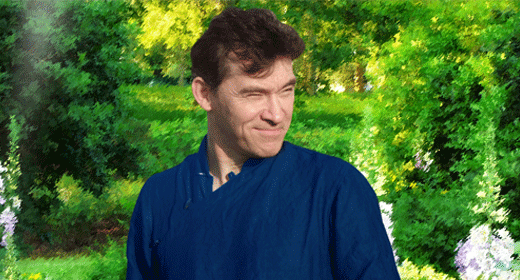by Dr. Steve Taylor PhD: When Desolation and Despair Give Rise to Spiritual Experiences.

Spiritual experiences are overwhelmingly positive experiences. They are experiences of rapture, in which we perceive reality at a heightened intensity, feel a powerful sense of inner well-being, experience a sense of oneness with our surroundings and become aware of a force of benevolence and harmony which pervades the cosmos. It seems almost paradoxical, then, that the experiences are frequently induced by states of intense despair, depression, or mental turmoil.
I collected many examples of this for my recent book Out of the Darkness. One woman described to me how, at the age of 20, she became so severely depressed that she had to be admitted to hospital. While there, she picked up a marble which happened to be lying on her bedside cabinet, and started playing with it in her hands. All of a sudden, it was as if the familiar world melted away, replaced by a vision of beauty and perfection. As she describes it:
I saw reality as simply this perfect one-ness. I felt suddenly removed from everything that was personal. Everything seemed just right. The marble seemed a reflection of the universe. All my ‘problems’ and my suffering suddenly seemed meaningless, ridiculous, simply a misunderstanding of my true nature and everything around me. There was a feeling of acceptance and oneness. It was a moment of enlightenment. The euphoria and inexplicable rush of ‘knowledge and understanding’ (it was like suddenly gaining access to a whole new comprehension of what we call ‘reality’) following this episode lasted for days.
Similarly, a man described how he went through a long period of inner turmoil due to confusion about his sexuality, culminating in the breakdown of his marriage. This may have triggered the following awakening experience – according to him, the only one he has ever had:
It was our last family holiday before the break up. We were in Tunisia and went on an excursion down to the Sahara. We went on a camel ride across part of the desert and at the end of the day, I sat on the sand dune watching the sunset. There were quite a few people around but it was as if everyone else disappeared. Everything just ceased to be. I lost all sense of time. I lost myself. I had a feeling of being totally at one with nature, with a massive sense of peace. I was a part of the scene. There was no ‘me’ anymore. I was just sitting there watching the sun set over the desert, aware of the enormity of life, the power of nature, and I never wanted it to end.
These ‘spiritual emergencies’ can sometimes be so powerful that they lead to permanent change of being. It is very significant that many great spiritual teachers or gurus have found enlightenment after intense periods of mental torment. The most enlightened person I know personally is a 90 year-old spiritual teacher called Russel Williams, who has been the president of the Manchester Buddhist Society for over half a century. Russel had his first major enlightenment experience as a young man, after a long period of frustration. As he describes it:
I was in a state of desperation. Eventually I shouted out ‘Somebody help me!’ and it was suddenly as if a blanket was dropped over me. I felt an incredible sense of peace and freedom, a completely different person inside. And that freedom and peace have continued inside me right until now.
Eckhart Tolle had a similar awakening through great turmoil. I interviewed about his experience for Out of the Darkness, and he told me that, until the age of 29, he lived with ‘a sense of great fear of life; fear of the future, fear of the meaninglessness underneath it all.’ His growing despair culminated in the transformation described in The Power of Now, when on the brink of killing himself, his ego dissolved away, leaving him in a state of pure peace. As he describes it: ‘The next day I walked around the city in utter amazement at the miracles of life on earth, as if I had just been born into this world.’
Dissolving Psychological Attachments
The key to understanding these experiences is the concept of attachment. Normally, as human beings we are psychologically attached to a large number of constructs, such as hopes and ambitions for the future, beliefs and ideas concerning life and the world, the knowledge we have accumulated, and our sense of status or of our appearance. These are accoutrements which become attached to the sense of self but which are not actually a part of our true nature. At the same time, there are more tangible attachments, such as possessions, jobs, and other human beings whose approval and attention we might crave. These are the building blocks of the ego. We feel that we are ‘someone’ because we have hopes, beliefs, status, a job and possessions and because other people give us approval.
However, in states of despair and depression these psychological attachments are broken. This is the very reason for your despair: because the constructs you’ve been depending upon for your well-being have been removed; the ‘scaffolding’ which supported your sense of identity has fallen away. Hopes and beliefs are revealed as illusions; your possessions and status have been taken away, your friends or lovers have rejected you. As a result, you feel naked and lost, as if your identity has been destroyed. But at this very point you are, paradoxically, close to a state of liberation. You are in a state of detachment. Your Self has been released from external constructs. In an instant, therefore, the pain of despair and desolation can switch into a state of freedom and joy.
This is close to the interpretation which Russel Williams and Eckhart Tolle have given of their awakening experiences. According to Russel, his enlightenment experience was a matter of ‘Letting go of everything which I thought was me. The frustration was so much that my old self has to give way.’ While according to Eckhart Tolle, his experience was ‘a death of the sense of self which lived through identifications, identifications with my story, things around me in the world. Something arose at that moment that was a sense of deep and intense stillness and aliveness, beingness.’ In other words, both of these teachers saw their enlightenment experiences in terms of detachment.
But at this very point you are, paradoxically, close to a state of liberation. You are in a state of detachment. Your Self has been released from external constructs. In an instant, therefore, the pain of despair and desolation can switch into a state of freedom and joy.
Encounters with Death
Encountering our own mortality can have a very powerful spiritual effect. Like states of despair and depression, death can induce a state of detachment, in which we become free of psychological attachments. The German Zen Buddhist Karlfried Von Durckheim experienced this during the First World War, when being surrounded by death made him aware of that there was a part of his being which transcended physical extinction. Later, he collected reports of similar experiences during the Second World War, and found that they were surprisingly common. He found examples amongst soldiers who believed they were about to die on the battlefield, inmates of concentration camps who had lost all hope of survival, and people who were convinced they were about to die in bombing raids.
Such realisations can also occur after a person is diagnosed with a fatal illness, and is told they only have a certain amount of time left to live. Initially he or she experiences feelings of bitterness and despair, which may give way to a sense of serenity and acceptance and a new spiritual perception.
Many people who return from encounters with death – either because a threat passes or they make a miraculous recovery – undergo a permanent spiritual shift. This is one the most significant features of near-death experiences. Most of those who undergo the experience gain a new spiritual outlook, becoming less materialistic and egotistical and more compassionate, more concerned with helping and serving others than fulfilling their own desires and ambitions. They are no longer afraid of death, they develop either new or intensified religious and spiritual beliefs (though realising the inadequacy of organised religion), and may even develop paranormal abilities. They also report a much greater capacity for joy, and a heightened appreciation of beauty. As one woman who died for a short time after heart attack told the researcher Margot Grey for her book Return From Death:
The things that I felt slowly were a very heightened sense of love, the ability to communicate love, the ability to find joy and pleasure in the most insignificant things about me…I seemed to have a very heightened awareness, I would say almost telepathic abilities.
While another person who had a near-death experience after a heart attack told Grey:
Since then, everything has been so different. I go out into the sunlight and I can taste the air; the sky is so blue and the trees are much greener; everything is so much more beautiful. My senses are so much sharper. I can even see auras round trees.
Many people who return from encounters with death – either because a threat passes or they make a miraculous recovery – undergo a permanent spiritual shift. This is one the most significant features of near-death experiences.
Like intense despair and desolation, imminent death dissolves psychological attachments. If you know you are going to die soon, there can be no more hopes or ambitions for you. Your possessions, your successes, the status and the knowledge you’ve accumulated can have no more meaning, now that you are going to be separated from them forever. The normal worries and concerns of daily life fade away for you too, as does your attachment to your career and to the people whose approval you sought.
This is why, initially at least, facing death is a painful experience. You are stripped of the externalities which give you your sense of identity, security and well-being. You are literally reduced to nothing. Many people do not move beyond this pain; for them the process of dying is simply a depressing and devastating experience, not redeemed by any sense of joy or meaning. But for some people this state of enforced detachment brings about a shift to a spiritual state. As the attachments dissolve, there is a sudden intensification and stilling of life-energy, enabling the dying person to look at the world with fresh, child-like vision, to experience serenity and peace inside, and to become aware of their essential oneness with the cosmos.
So where does this leave us? Does it mean that we have to suffer in order to have spiritual experiences or become enlightened? Do we have to make our lives as barren and miserable as possible, to renounce the world, take vows of silence and sleep on cold stone floors for years?
As the attachments dissolve, there is a sudden intensification and stilling of life-energy, enabling the dying person to look at the world with fresh, child-like vision, to experience serenity and peace inside, and to become aware of their essential oneness with the cosmos.
Of course not – there is a ‘middle way’ between this extreme suffering and a life of attachment. As we live our lives, we should try to make sure that we don’t become too dependent on externalities like money, status, hopes, beliefs, our self-image and other people. We should try to make sure that we’re always partly rooted inside ourselves, so that we never give ourselves completely away to the world. We should remember that the only true source of well-being is inside us, and that to attach ourselves to externalities means losing touch with this well-being. If you make a conscious effort to remain self-sufficient and connected to your true self, your being will be open and free, and there will always be space for Spirit to flow through.
If you make a conscious effort to remain self-sufficient and connected to your true self, your being will be open and free, and there will always be space for Spirit to flow through.









































